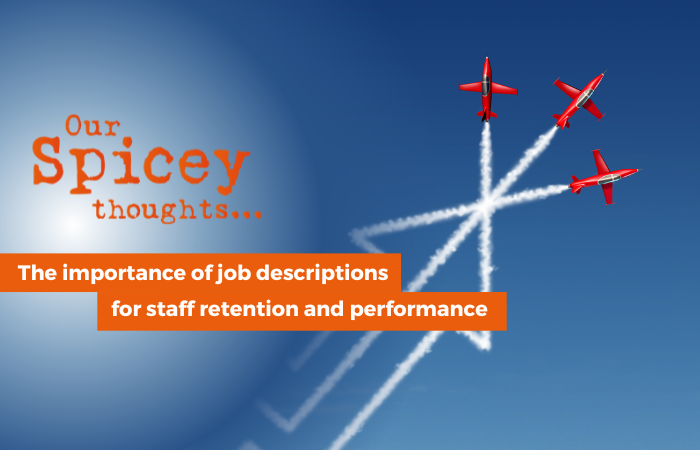
Many things became redundant during a pandemic – travel, music festivals, alarm clock sales (yes, really!) and for many, the good old office work environment.
But businesses still need to keep moving forward. They still have to serve their customers, source their supplies, and recruit and train new staff – only, all these “business as usual” processes look a lot different now than they did pre-COVID.
At Spice HR HQ, we’ve experienced changes too: our dynamic duo has become a beautifully rounded team of five.
We personally experienced what it’s like recruiting, hiring, and onboarding new staff remotely – a process that may be daunting for those new to the world of managing remote employees.
In this blog, we’ll explore how recruiting and onboarding are done differently over lockdowns and post-COVID and offer some insight on how to approach it with your business.
But first, we’d love to introduce you to the newest Spice Gals on our team.
How To Tackle Hiring and Onboarding New Staff Remotely
Let’s Talk About Spice
2021 was a year of growth for Spice HR, which meant we were able to bring a few fresh faces onto our team.
Pre expansion, you would be communicating with the original Spicey duo, Nicole and Nichola – but now, your documents and emails may be crafted by Justine, Bianca or Nina.
Let’s do a brief intro so that you can put a face to each new name:

Justine has more than 20 years of management experience, bringing a wealth of knowledge to the team. She has a passion for helping others thrive and for encouraging equity and inclusion. She believes there are always opportunities for improvement, continued personal growth, and doing the right thing, even when no one is looking.

Nina has a new HR degree under her belt, along with a past life as a manager. She has a passion for all things HR and has come on board to help our clients with their HR projects. When she’s not neck-deep in HR, Nina is running around after her toddler or out and about exploring the best places to grab a bite to eat.

Bianca is our Spicey queen of all things admin. With 20 years in the workforce to back her up, she’s the one taking care of all the details and making sure everything runs smoothly. Like any good Spice Gal, Bianca is always up for a challenge and will often dive into the world of HR to lend the rest of us a hand. Like most Aucklanders, Bianca is looking forward to jumping on a plane and travelling again when the opportunity arises.
There you have it – with five members, we’re now officially as big as the actual Spice Girls and well on our way to Spice Gal World Domination!
Our newest team members have been onboarded and enveloped in the warm glow of our spicey culture. If you’re wondering how that works in times of lockdown and remote work, keep reading for some insight.
Things To Consider When Hiring and Onboarding New Staff Remotely
While the fundamentals of recruiting and onboarding remain the same, the process may look a little different. Due to lockdowns or location, some managers may not meet their employees in person before hiring, but that doesn’t need to be an issue.
In fact, thanks to digital advances driven by the pandemic, it’s now easier than ever to take care of hiring and onboarding new staff remotely. Let’s take a closer look at each part of the process.
Recruiting Remotely
The right fit remains one of the most important aspects of recruitment. And getting the right fit means effectively marketing your employee value proposition. To attract an employee who embraces and enhances your culture, you must be able to describe and demonstrate that culture.
This goes further than just your job advertisement or position description. Put some thought into how your brand appears from the outside looking in, via social media, your website, and word of mouth from previous and current staff.
Share pictures and videos online of how your team collaborates, even in a remote work environment. Talk about your camaraderie in an authentic way, and work on building genuine connections between your existing employees to organically build a great culture that’s visible to all.
Virtual interviews are often more efficient than in-person interviews and can be less daunting for candidates. Zoom or Teams are usually the go-to methods here, and most people are more than familiar with how they work by now!
When it comes to paperwork, it’s now possible to do it all digitally. Even contracts can be signed virtually using a tool like DocuSign or HelloSign. That means a faster, more efficient hiring process. And if you’re lucky enough to have an HRIS, then it’s all automated for you!
Onboarding New Staff Remotely
How does onboarding new staff remotely work? You can’t give them an office tour and introduce them to your team during a morning coffee break, so what’s the procedure?
Well, setting expectations is still crucial, so it’s important for managers to communicate with a new hire before their first day on the job. This is an opportunity to provide any documents or materials that they need to understand how your business works.
Share your values and culture in ways that feel appropriate; written documents followed up with a Zoom call for a more in-depth chat is a good start.
You’ll also need to share copies of your code of conduct, employee handbook and any other documents that can help your new hire integrate into the business smoothly.
How Do You Onboard Remotely?
One on one and group video calls will be needed to introduce the team, and these should continue regularly to ensure that camaraderie and connection develops between your employees.
You may even want to set up a mentor or “buddy system” so your new hire has a closer relationship with a specific person (whether that’s their direct manager or a colleague) – someone who’s on-call to help them navigate their new role.
Bear in mind that it can take a little longer for someone to integrate into a new work environment remotely. They don’t have the opportunity to interact with managers and colleagues as organically as they would in an office environment.
Give them the time and resources they need, and don’t assume that if they’re quiet, they’re doing just fine. Managers must be proactive and check-in, ask for feedback, and be ready to provide more support if needed.
Spicing Up Your Hiring and Onboarding
It can be tricky to navigate the process of hiring and onboarding new staff remotely in this world of post-pandemic business.
If your business needs some support to recruit and onboard new team members – remotely or otherwise – the Spice HR team are here to help.


 How To Be An Ethical Leader During A Crisis
How To Be An Ethical Leader During A Crisis
